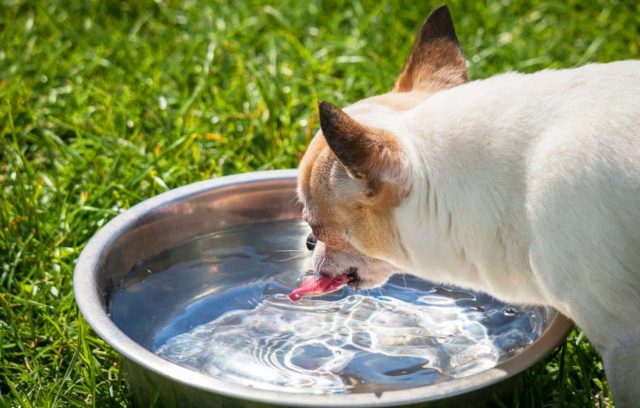
As responsible dog parents, we want to give only the best to our pets. We want them to be in the prime of health and well-behaved. We see to it that they are eating the right food and snacking on healthy treats.
CONTENTS:
- How is giving apple cider vinegar to your dog a benefit?
- Apple Cider Vinegar for Dogs Ears, Paws, Stomach, Breath and Immune System
- ACV for Dogs Safety Tips
- Do Dogs Like the Taste of Apple Cider Vinegar?
- How Much Apple Cider Vinegar Should I Give My Dog?
We become physically active for them. We make sure that they receive the exercise they need with indoor dog games on icky days and the training they deserve to develop a deeper bond with them.
Among the many healthy foods and treats we can give our pets, giving them apple cider vinegar is now becoming a popular trend. That’s right. Apple cider vinegar is not only good for humans but for our canine friends as well.
In the following post, we have listed safety tips as guidelines when giving apple cider vinegar to your pets.
How is giving apple cider vinegar to your dog a benefit?
There are many benefits of using ACV in us humans, but dogs can benefit greatly by using this wonderful natural remedy.
Apple Cider Vinegar for Dogs Ears, Paws, Stomach, Breath and Immune System
- As a natural detoxifier, apple cider vinegar is an excellent anti-bacterial, anti-fungal and antiseptic. Subsequently, it also makes your pooch’s immune system strong since it helps in maintaining a balance of the good bacteria in your dog’s gastrointestinal tract. Furthermore, the vinegar can aid in soothing your dog’s skin problems resulting in a healthy-looking coat.
- A robust immune system will increase your dog’s stamina and overall health leading to a healthy, happy pet and fewer vet bills.
- As a neutralizer, using apple cider vinegar for dogs is a cheap option for the relief of joint pain. The vinegar works by normalizing the acid balance in the blood and breaking the calcium deposits in your pooch’s joints. Arthritic dogs are prone to hip dysplasia and can benefit from apple cider vinegar.
- If your dog belongs to a breed that is prone to ear infections, you can use apple cider vinegar to treat the infection. Using a cotton ball, dip it into a small mixture of apple cider vinegar and water. Clean your dog’s ears using the dipped cotton ball to help with the treatment.
- Using apple cider vinegar for dogs’ fleas and tics is another helpful tactic. While it doesn’t kill fleas and tics outright, these pests dislike apple cider vinegar’s smell and taste so they jump ship. One of the best ways to use this natural flea repellent is to mix 1 cup apple cider vinegar into 2-4 cups water and rub it over your dogs’ fur.
- Don’t let your doggy dearest suffer from canine dandruff. Let apple cider vinegar come to the rescue. ACV can be poured full-strength on your dogs fur during bathing. You’ll notice it adds a nice rejuvenating shine to their coat. It also helps balance pH levels in their skin.
You can also make a post bath time ritual with a vinegar final rinse spray. Simply use the flea/tic remedy mentioned above (1 cup vinegar to 2-4 cups water) put it in a spray bottle and spritz your pooch. It will help deodorize the coat and help give it a healthy shiny glow.
ACV for Dogs Safety Tips
- Put a small amount of ACV in your pet’s drinking water. Your dog may not like the taste initially. If your pooch is not a very good drinker, try adding the ACV to their food. For a special treat, serve the apple cider vinegar with honey. Ideally, the ratio should be one teaspoon for fifteen pounds of body weight. Or for larger dogs one tablespoon per fifty pounds. But start with small amounts and gradually increase the value to the right proportion.
- Ensure that the apple cider vinegar is raw, unheated, unpasteurized and organic vinegar. It should be diluted with water before giving it to your dog.
- If your dog has a chronic yeast infection, easily irritated intestines or overly active acidic systems, don’t use the vinegar as it can worsen these health conditions. Also, don’t apply the vinegar directly on the skin around the eyes or on sores.
Using apple cider vinegar for dogs is an inexpensive and great solution for common health problems. It’s even vet recommended to help treat more serious issues like parvo in dogs. It’s a home remedy that, if appropriately applied, will result in a happy, healthy dog. However, if you have doubts about using apple cider vinegar or if you have any health concerns, talk to your veterinarian first.
Do Dogs Like the Taste of Apple Cider Vinegar?
It’s really hit or miss whether your dog will like ACV. Some dogs take to it right away and some give you that look like, “What are you trying to do to me?”
It just depends on your dog. So your best bet is to try it and see what they do. If they absolutely will not take even a tiny drop, you can always dilute it in water so it isn’t as noticeable.
How Much Apple Cider Vinegar Should I Give My Dog?
The amount of apple cider vinegar you give your dog depends on a few things. If you are applying ACV as a topical to their skin or coat it only takes a little bit in a diluted spray bottle like we mentioned above. If you use it directly in their bath feel free to either pour it on directly or put a healthy amount in the bath water.
If your dog is ingesting it for it’s many other benefits Becki Baumgartner, a veterinarian in Nashville, TN, recommends starting with a lower amount: 1 tsp per fifty pounds of dog. If you have a little guy like we do you can start with about 1/4 tsp. If they seem to be doing okay with that amount you can increase it to 1 tsp per fifteen pounds.









